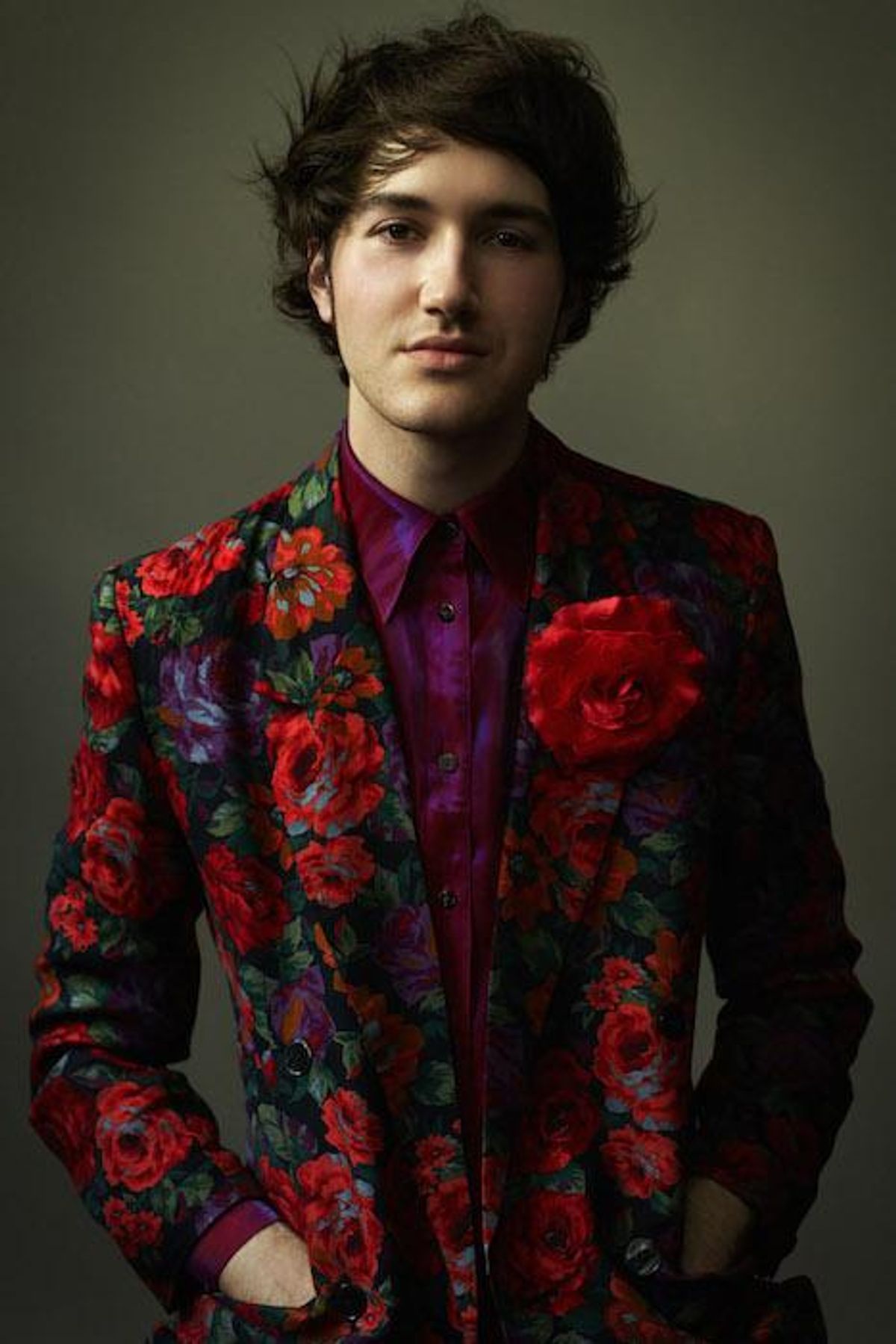It's a grey, slushy Sunday, two days before Valentine's Day and two days after a blizzard--February in Manhattan, in other words. Max Vernon is running ever so slightly late for our interview at Pieces, a gay bar on Christopher Street, a few blocks from the Stonewall Inn.
"I'm a couple blocks away," Vernon texts. "Running over now in pointy silver shoes!"
It's dark inside Pieces, a no-frills kind of place, in that very particular way that gay bars are dark on Sunday afternoons, the disco ball still spinning as weak light filters in through the front window, black walls and black banquettes swallowing any illumination, the glare from the wall mounted flatscreen TVs playing music videos making it somehow even harder to see. The most basic pop music you can imagine is blasting as the bartender serves the dozen or so guys hunched over their drinks at the bar.
Vernon chose Pieces as the site for our chat because, unlike a lot of the gay hotspots in Hell's Kitchen, this West Village watering hole feels like a distant, though far less ramshackle and kitschy cousin of the UpStairs Lounge, the New Orleans bar that was until this past June the site of the most deadly attack on a gay bar in U.S. history, and the subject of Vernon's new Off-Broadway musical, The View UpStairs.

Nathan Lee Graham & Randy Redd in The View UpStairs
When Vernon arrives he orders a whiskey on the rocks, despite having just passed a kidney stone the day before. "Don't tell my doctor," he jokes.
For someone who is in the process of bringing a brand new original musical to the stage in less than a week, the composer and lyricist is surprisingly energetic. He's eager to share photos on his phone of the set and of costumes, of the jacket he plans to wear on opening night and memes of The View UpStairs's costume designer Anita Yavich flipping the double bird at Donald Trump's inauguration last month. He is, indeed, wearing a pair of silver Chelsea boots, along with a vintage Lanvin tuxedo jacket that his stepmother bought at a Long Island tag sale for $2, and an enormous rhinestone broach shaped like a lizard. Vernon has a thing for broaches. He has a thing for fashion in general, which is probably why the main character in The View UpStairs just happens to be an upstart fashion designer. "I don't want to say the main character is me, because there's enough about him that is not me," he explains. "But I am working through shit, like every artist."
Related | When A Gay Holy Place Burned In New Orleans
I ask if he thinks many gay people are familiar with the 1973 arson attack at the UpStairs Lounge that killed 32 people. Vernon suggests we ask around the bar. "I would say 90 percent don't, even now. And when I first started writing the piece five years ago, no one knew."
Vernon first encountered the story of the fire on the internet as a gender and sexualities major at NYU studying the pre-AIDS gay culture of the 1970s. He was shocked to learn that even his professors had never heard of the tragedy. "I thought I was reading something that was fake news--proto-fake news--because I was like, 'How have I never heard of this?'"

Jeremy Pope in The View UpStairs
The leap from largely forgotten gay tragedy to musical theater isn't exactly an obvious one. But Vernon says the queer activist in him was determined to tell the story of the UpStairs Lounge, and though he spent his early 20s in New York's anti-folk scene and performing with his dance punk band Decades, his earliest identity was that of a theater queen. "When I was five or six years old, every night I would listen to musical theater soundtracks," he says. "I told my mom that I wanted to audition to be Cosette in Les Miserables. No one told me that I couldn't be Cosette."
He began working on the early version of The View UpStairs five years ago. By the time he was ready to workshop the show last summer at Chicago's Pride Films and Plays, it had developed into what Vernon describes as a conversation between 1973 and the present. "Originally, the narrative was about someone who's only experienced privilege, who's only experienced things getting better," he says. The main character's journey into the past where he encounters the denizens of the UpStairs Lounge and the institutionalized homophobia they experienced in an era when homosexuality was literally illegal, was meant to shock him out of complacency. Then, this past June, at the height of LGBT Pride season, Omar Mateen entered Pulse nightclub in Orlando, slaughtering 49 people. "It totally shifted the paradigm of what the show is," says Vernon.
In the show's current incarnation, post-Pulse, post-Donald Trump, the main character, Wes (played by Jeremy Pope) is aware that the pendulum is swinging in the opposite direction. "It's not that he's never known oppression. He has," Vernon says. "He thinks the only way that he can have a voice, to make an impact, is to become famous, to be a celebrity and have a million followers on Instagram."
Related | OUT100: The Survivors and Heroes Of Pulse
Disconnection is a major theme of the show, which begins previews at New York's Lynn Redgrave Theater this month, with a cast that includes Nathan Lee Graham and Frenchie Davis: the disconnection we experience in the age of Grindr as well as the rift that the AIDS crisis of the '80s created between the today's LGBT community and the generation that came before.

Jeremy Pope & Taylor Frey in The View UpStairs
"We see Wes, a modern character, who's locked in this digital technological world," says director Scott Ebersold. "There's something missing from his life, and he meets this group of people who are connecting all the time. They don't have any rights, and he has all these rights. We see these two worlds collide."
For Ebersold, the music was the entry point into this story. He had been focused on the idea that the music of Rodgers and Hammerstein, the music of the golden age of Broadway, was the popular music of the time. "I wanted to find a new voice in musical theater that sounded like music that could be on the radio," he explains. "Max's music, when I heard it, was exactly the kind of music I was looking for."
Vernon compares the show's sound to Hedwig and the Angry Inch and The Rocky Horror Show. He hopes The View UpStairs will truly shock people. "I think it's amazing that Kinky Boots exists, that we can have this gay, family friendly show," he says. "But as an artist, I've always been way more interested in reclaiming the subversive power of theater. The show is genuinely fucking subversive. It's not a family-friendly show. We've got 3,000 penises tacked up on the walls."
He also hopes that audiences will leave with some of the galvanizing power that working on the show has given the cast and crew in these uncertain times. "It's making us feel sane. We're speaking truth to power, and people who see this, who are so pissed off right now, they're going to see the show and be like, 'Fuck yes!'I think it's going to make people want to put on their armor and go back into battle."
On our way out of the bar Vernon decides to conduct his informal poll. Of the five people he asks including the bartender, only one has heard of the UpStairs Lounge. For a split second he seems disheartened, but he perks ups quickly, strutting up Christopher Street in his silver boots, his resolve stiffened. "That's why I'm doing this show."




























































































Did 'The White Lotus' waste Lisa's acting debut?